I caught a great episode of A Kist o Wurds on BBC iPlayer - Andy Brown from Ballywalter, Will Cromie (formerly of Ballywalter) and my friend and neighbour John Adair. Catch it here for the next few days.
John's bit starts at about 22 minutes in, and his quip about "that oul' Posh Spice" needin' a soda farl and a Manx kipper - best episode of the programme I've heard in ages - great stuff!
Sunday, November 30, 2008
A Kist o' Wurds
Saturday, November 29, 2008
Covenanter Postcards for sale: £3.95 for pack of 7

A friend of mine, County Antrim man Alastair Bonar, has been collecting Covenanter items for many years and has a wonderful library of Covenanter books, including a first edition of Rev Samuel Rutherford’s Letters published in the late 1640s, and Christ Dying and Drawing Sinners to Himselfe published in 1647. Rutherford was a friend of the early Ulster-Scots ministers and wrote to them just before they sailed for America onboard Eagle Wing.
Alastair also has over 300 antique Covenanter postcards, showing scenes from Covenanter history and of many of the monuments across Scotland, from the famous Two Margarets memorial stake at Wigtown, to the large obelisk at Deerness on Orkney where 250 Covenanters drowned when the slave ship they were in, heading for America, was shipwrecked. 10 of the survivors are known to have fled to Ulster for refuge.
Alastair has just produced a new range of postcards, of portraits of famous Scottish and Covenanter heroes of the faith – John Knox, John Welsh, Donald Cargill, John Brown of Priesthill, James Guthrie and James Renwick. The portraits on the cards are from John Howie’s book The Scots Worthies.
To order a pack of seven cards (six individual portraits plus one card featuring all six), please send a cheque for £3.95 inc. postage (payable to A. Bonar) to:
A. Bonar,
c/o 1 Goland Buildings,
Glencairn Park,
Newtownabbey,
Co Antrim
BT36 5EN
Friday, November 28, 2008
Protestant Art
Protestantism and visual art is often an uncomfortable pairing.
In my professional life, I have often found that clients who are traditional Ulster Prods either don't value, or are highly suspicious of, visual presentation. In Reformation times, all sorts of ornament and imagery was smashed to pieces - for example it was the followers of John Knox who smashed the grand Italian grave of King Robert the Bruce in Dunfermline Abbey in 1560; the damage was so bad that it wasn't found again until 1818. The wee halls I grew up in only ever had the Word on the walls - a scripture text above the platform, and maybe a few more texts around the walls. I've even designed a few texts over the years for my uncle John who runs the People's Hall in Portavogie, to match the original hand painted one which has been there since the Hall opened in the 1930s.But art is increasingly common today in churches all across Ulster, usually as tapestries or other hand-sewn fabric art.
So here's a suggestion. The most iconic piece of graphic design from the Reformation era is (for me) the wonderful title page of the Geneva Bible. It features the emblems of the 12 tribes of Israel, the 12 disciples, the 4 gospel writers in a beautiful woodcut style. Here's the 1599 version - feel free to make use of this - pass it on to the arty sorts in your own church the next time they're wondering about what they can hang on the walls. Click on it to get the full size version.
(there also seems to be a piece of staff music along the bottom edge - if you know what tune this is please let me know)
Thursday, November 27, 2008
World financial meltdown and the breakup of the USA?
This article makes interesting reading, from one of Russia's leading political analysts.
He says: "...In 2006 a secret agreement was reached between Canada, Mexico and the U.S. on a common Amero currency as a new monetary unit. This could signal preparations to replace the dollar. The one-hundred dollar bills that have flooded the world could be simply frozen. Under the pretext, let's say, that terrorists are forging them and they need to be checked..."
Something very similar happened a few years ago here in Northern Ireland.
PS - as usual there's lots of stuff on YouTube about the Amero.
Tuesday, November 25, 2008
Dublin and Chinese Democracy
I was in Dublin yesterday meeting with Tourism Ireland. It was a beautiful crisp, cold, autumn afternoon. Had the camera in my pocket and took a few pics of the Daniel O'Connell monument on O'Connell Street. It has a very impressive Red Hand of Ulster, which I'll add to this project I'm building up.
En route to the meeting, I went into HMV and bought a copy of the new Guns n Roses cd "Chinese Democracy". I listened to it last night on the drive home It is rubbish, as numerous online reviews will confirm.
It just goes to show that - even after 17 years of work, $13m dollars, every gadget and instrument you can think of, expert production in the best recording studios on the planet, guest appearances by some of the world's best musicians (who were later dropped from the final mixes) - no amount of time, money or gadgets will automatically produce great music. "Chinese Democracy" is one to be avoided for sure.
This, on the other hand, IS great music. Two voices, two acoustic instruments. You can't get better than this - Gillian Welch and David Rawlings live in London back in 2006. (their first CD was called "Revival"):
Sunday, November 23, 2008
1859
I am delighted to see that the 1859 Revival commemorations are coming together. There will be a sequence of events in mid-Antrim, organised by the Presbyterian Church, Reformed Presbyterian Church, Church of Ireland under the theme "Revive Us". Their website is an excellent starting point for 1859 information, history, books to read, all sorts of excellent materials.
I notice that next year (the 150th anniversary of the Revival) the 12th July is on a Sunday. I would hope that people of influence within the Grand Orange Lodge of Ireland will organise an appropriate event, or perhaps year-long initiative, to educate today's membership. The 12th celebrations in 1859 were remarkable - I may well blog more detail about this over coming weeks.
The map below shows the places which had experienced Revival by the end of October 1859.
The other document below shows that 14 years earlier, the people of the Ards Presbytery were preparing their hearts and lives for "the revival of religion in our Church".
The Revival had a massive spiritual impact on our country - which also became a social and political impact as well. Life in Ulster was changed in 1859. The Presbyterian Church is holding a 6 week long prayer initiative entitled "Awake! Prayer: Stirring Passion for Mission" which will run from 1st March until Easter Sunday - a recognition that revival only comes when God's people have a heart for prayer. I commend them for their vision. For all of these positive steps, revival does not come about by man-made techniques or strategies. It's not a tap that can be turned on by people. But if our lives, hearts and prayers are united in a cry to God for revival in Ulster today, and if He chooses to answer, 2009 could be a special year too.
Saturday, November 22, 2008
The Ulster Scots in America
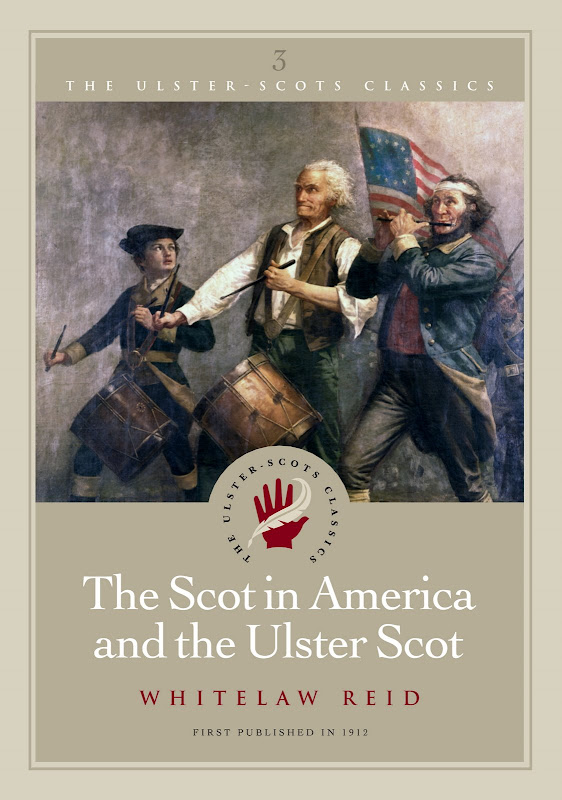 Whitelaw Reid was US Ambassador to Britain. He was of Co Tyrone Covenanter descent, and his ancestors emigrated to the USA in 1795. When they got to the US, they bought a farm - but soon after discovered that part of the sale included the running of a ferry service on a Sunday. So they sold the farm!
Whitelaw Reid was US Ambassador to Britain. He was of Co Tyrone Covenanter descent, and his ancestors emigrated to the USA in 1795. When they got to the US, they bought a farm - but soon after discovered that part of the sale included the running of a ferry service on a Sunday. So they sold the farm!
Whitelaw was deeply interested in his Ulster roots, and after unsuccessfully running for US Vice-President, he became US Ambassador to Britain. Shortly after taking up his post, he gave a series of lectures in Edinburgh and Belfast entitled "The Scot in America and the Ulster Scot". This is the Northern Whig editorial on 2 November 1911, the morning after Whitelaw Reid’s lecture in Edinburgh, entitled "The Ulster Scots in America". The editor at that time was Joseph R Fisher:
"...Let us now praise famous men and the fathers that begat us’ is a command not unhonoured in Ulster. But it is even better when others praise us as well as ourselves, and every Ulsterman will read with a thrill the eloquent and vivid tribute paid last night by Mr WHITELAW REID, the United States ambassador, to the men of our race and blood for the part played by them in the building up of the great Republic. That tribute is intensified by Lord ROSEBERY’s comment that, though he loved Highlanders and lowlanders, when he came to the branch of the Scottish race that had been grafted on the Ulster stem he took off his hat in veneration and awe.
Speaking at Edinburgh, Mr WHITELAW REID naturally gave precedence to the Scots, but the Ulster Scots were the burden of his theme, and men from North of the Tweed had to yield to men from north of the Boyne. The Puritan in America, said the lecturer, had had his day, and so had the Cavalier, and it was full time for the Scot and for the Ulster Scot. Part of the tale has been told before in PARKMAN’s vigorous prose in ‘The Conspiracy of Pontiac’ and in Mr ROOSEVELT’s epical ‘Winning of the West’; but the value of Mr WHITELAW REID’s address is that it throws the facts into new perspective, and gives us an admirable summary of what Lord ROSEBERY aptly described as ‘a long catalogue of splendid achievements’.
Since the day in 1718 when the first flight of Ulster emigrants arrived in Boston in five small ships to found an American Londonderry, Scoto-Irish influences have had their full share in moulding the destinies of the New World. Not that the lines of the pioneers were laid out in pleasant places. PENN’s rule was a mild one, but, as Mr WHITELAW REID reminds us, he was a man of business and he used the Ulster Scots as a kind of buffer between the Quakers and the Indians. They held the frontier, stood siege in their rude log cabins, ambushed and were ambushed by war parties, while the Quakers, well out of harm’s way, preached the doctrine of gentle treatment of the tribes. It may be that the Ulster settlers were more prone to use the steel gauntlet than the velvet glove, but they ran all the risks, and it is directly to them that the success of the first great movement westward is due.
They were soon to prove that they could cope with trained soldiers as well as with armed savages. When the agitation that ended in the Revolution began the Ulster Presbyterians numbered one sixth of the population of the American colonies. But, in Mr WHITELAW REID’s words, their intellectual and moral responsibility for the War of Independence was far greater than their numbers would seem to warrant. They were the heart and soul of the movement from the first, partly on account of the wrongs they had suffered at home, still more because, as BANCROFT says, ‘their experience and religion alike bade them meet oppression with prompt resistance’. GEORGE the THIRD and his Cabinet comforted themselves with the thought that the American would not fight, or if they did that the first skirmish would find them clamouring for mercy. The Ulster Scots, having put their hands to the plough, were not of a stock that turns back before the work is finished. When taxed with breaking their oath of allegiance they answered ‘The oath binds only while the KING protects’; and the Declaration of Independence was written by the hand of an Ulster Scot who was Secretary of the Congress, was read to the people by an Ulster Scot, and first printed by an Ulster Scot.
In the field they gave as good an account of themselves as in the council chamber. Almost half of WASHINGTON’s general officers were Scots or Ulster Scots, and in his catalogue Mr WHITELAW REID did not mention perhaps the most brilliant of them all, the ill fated RICHARD MONTGOMERY, who fell in the attempt to capture Quebec. The Irish contingents were the backbone of the American army, noted marksmen, indefatigable marchers, cool in advance and cooler in retreat, signalising themselves equally in affairs like the dash on Trenton or in the pluck with which they endured the horrors of the terrible winter months at Valley Forge. The Virginian sharpshooters, Ulster Scots almost to a man, are bracketed in military history with CRAUFORD’s Light Brigade in the Peninsula.
When peace came at last it brought to the front men of the same race, who handled with notable courage and skill the most momentous experiment in democratic government the world has seen. It is a big score for Scotland and Ulster that of the twenty-five Presidents of the United States almost half have hailed from one or the other.
Despite the stream of fresh blood that has poured into the States during the period between the Revolution and the Civil War, Scots and Ulster Scots still maintained their supremacy in that struggle. In GRANT on one side and STONEWALL JACKSON on the other they produced two leaders who are universally recognised as amongst the greatest soldiers of the nineteenth century, while it is a matter for legitimate pride that the anti-slavery movement had its origin among the Covenanters of South Carolina and East Tennessee twenty or thirty years before there was any organised opposition even in Massachusetts. It is always risky to draw modern lessons from the record of past events: many more elements enter into the problem than the average man is accustomed to allow for.
But if the record of the Ulster Scots proves anything it proves beyond doubt that they are a race who may be led, but will not be coerced, and, having once settled in their own minds the rightness of a course of action, will pursue it to the bitter end..."
................
Excerpt from the reprint's introduction:
The widespread interest in the Ulster-Scots at that time was reflected in a letter from Alice L. Milligan (1865-1953) that appeared in the Northern Whig on 2 October 1912: She wrote:
"...I would like to know to what extent the history of the Ulster Plantation occupies the history curriculum of Belfast University. Ulstermen should know how their ancestors came to live here. The Right Hon Whitelaw Reid dealt with the mysterious exodus of Ulster Scots to America in his recent lecture in the Assembly’s Buildings. The young Ulster Scots of today should understand how it was that men of their race in such numbers took part in the upbuilding of the American Commonwealth..."
This recognition of the Ulster-Scots is particularly significant since Alice Milligan was an Irish nationalist, a friend of James Connolly and a Gaelic League organiser. Moreover her plea that young Ulster-Scots should be taught about their history is just as valid and necessary today.
................
Copies of the reprint are still available from BooksUlster.com.
A Land Where We'll Never Grow Old
Another old hymn I grew up with, written by James C Moore around 1914. It was first recorded in the late 1920s (the best early version is by Alfred G Karnes) and then by the Carter Family in February 1932:
Friday, November 21, 2008
Too many James Hamiltons
I'm giving a short talk tonight on the Covenanters in Ulster, to Loughries Historical Society in Newtownards. I've decided to anchor it around the life and times of one man - Rev James Hamilton of Ballywalter (1600 - 1666) - to give the talk some local relevance.
But there are far too many James Hamiltons in Scottish and Ulster-Scots history:
1. James Hamilton arrived in Ulster with Hugh Montgomery in May 1606
2. When he needed to invite Robert Blair across the water to be his minister at Bangor, he sent James Hamilton of Kirktonholm as messenger
3. When Blair arrived, he mentored James Hamilton's nephew James Hamilton (the man I'll be taking about tonight).
4. Later in life, this James Hamilton was a minister in Edinburgh. There was at least one other Rev James Hamilton in Edinburgh at the same time
And there are more. Nearly as common back then as Mark Thompson is now! I'll hopefully post some pics later on to show you how the event goes.
.........
Just back in. Went well. Forgot to take photos!
Thursday, November 20, 2008
Membership list leaked
Was sent this earlier today:
CONFIDENTIAL MEMBERSHIP LIST LEAKED ON WEBSITE
A disgruntled ex-fan has published the Celtic season ticket list on his website. This leak has been criticised by the Celtic FC board and management who said that this could lead to serious damage to reputation, with people losing their jobs and their families.
Forums on the internet have been inundated with comments such as 'I could lose my job over this' and 'How can I show my face in public again'. One poor soul even threatened suicide if his friends and family ever found out.
The leaked list contained some surprises. It included a doctor, three policemen and even someone who lives in Glasgow. It also included the name of a 'major TV personality', believed to be Wee Jimmy Krankie. The other 5 people on the list have yet to be named.
A spokesman for Rangers said 'It is hard to imagine why these individuals became Celtic season ticket holders but in this day and age of depraved morality nothing surprises us anymore. Our thoughts are with the friends and families of all those involved, for the shame and embarrassment that this dreadful incident must have caused them. '
The Police have so far refused to rule out placing all those named on the list on the Football Supporters Offenders Register. However they did say they would also offer counselling and referrals to mental health authorities for all those involved.
........
(ps: this is just a joke, based on this recent incident. Feel free to substitute other teams names!)
Monday, November 17, 2008
Cheap Rangers Kits!
This is a community service post - any of you looking for Rangers shirts or leisurewear should get down asap to your local outlet of JJB Sports. I was in the Connswater shop today and all of the Rangers products are massively discounted - kids shirts (this seasons) are just £12.99. I got home and away for my two boys (the ones without the Carling sponsor).


Seems like there are serious business problems with JJB, with plummeting share prices, and there may have been some contractural problem between them and Rangers. Either way, they've decided to sell as much stock as they can as quickly as possible. A cheaper Christmas is good news all round!
(John - pity you don't have a JJB in Alabama! You could try their website instead?)
A Kist o' Words
I was recently interviewed for the BBC Radio Ulster programme "A Kist o' Words", talking about 3 old books - my Belfast printing of Robert Burns' poetry from 1793, my edition of Robert Dinsmoor from 1828 and the New Testament in Scots translated by Murdoch Nisbet. You can hear it again on Wednesday evening, and for all of this week on BBC iPlayer.
(if you're quick, there's an original edition of Dinsmoor available here for $200)
Sunday, November 16, 2008
Don't Believe the Hype
Too often we do believe the hype - because of its sheer quantity. However now and again evidence appears which challenges the modern orthodoxy. One of the most powerful and relentless of these orthodoxies is man-made climate change.
Recently, famous botanist and tv personality David Bellamy revealed that he had been dumped by the BBC about 10 years ago because he disagreed with the climate change lobby.
A couple of years ago, Channel 4 broadcast a documentary called "The Great Global Warming Swindle" - which is now available on DVD. Worth sticking on the Christmas list - but remember to recycle the wrapping paper and any unwanted packaging by putting it carefully in your blue bin. Not the black one. Or the brown one. Or the green one (if you have one of those)
Before today's era where every home has a row of multi-coloured bins, growing up on our wee 45 acre farm we often had small bonfires to get rid of the rubbish that was building up. It was great fun, watching tyres, plastic fertiliser bags, scrap wood and all sorts of agricultural waste go up in smoke. Big black billows of belching smoke towering up into the sky and probably visible for miles around.
Mind you, whilst dodging the exploding aerosol cans as they zoomed past your head was one of the highlights, it was probably not such a good idea. I'm pretty sure farmyard bonfires are illegal now as well.
Friday, November 14, 2008
The slow death of congregational singing
My good friend Robin Fairbairn recently introduced me to The Briefing, a magazine from Matthias Media. The few editions I have read articles from have been magnificent. This one really made an impact on me, as it's a bit of a personal soapbox:
"...whether you travel across the urban areas of Asia, Africa, North America or Australia, everywhere you go, increasingly, the singing in the church—both the songs that are sung and the style of music—is the same. It's the McDonaldization of our world.
And in every church you visit across the world, the music is just the same. I'd describe it as the ‘Hillsongization’ of music except that it's such a clumsy word. Oh, the words of the songs might differ, but it's the same music team singing the same way.
There's the obligatory leader with the obligatory two or three singers accompanying her, the obligatory drummer, the obligatory keyboard player and the obligatory two guitarists. You're allowed some freedom in your choice of a sax or a flute, depending on the resources available, but it's all exactly the same for every song in every place..."
Full article is available here
Predestination
Inching away from a dispensational upbringing to a more Reformed position has its challenges. I had two communications in the past 48 hours about predestination:
1. A text message which said: Presbyterian Mutual Society has collapsed. No surprise really - it was predestined.
2. An email about William of Orange:
"...William’s formidable invasion fleet first set sail from Den Briel, near Rotterdam, on 20 October in fine weather but encountered such a severe storm that the fleet was scattered. Barrels broke loose and rolled around below decks and perhaps as many as 1,300 horses were killed, suffocated below battened down hatches or as a result of having their skulls smashed against the sides of the ships. William’s flagship was almost wrecked. The fleet was obliged to return to various Dutch ports. Although only one ship had been lost in the storm, the loss of so many horses was a serious blow. When Gilbert Burnet, William’s chaplain and the future Bishop of Salisbury, who had been on the same ship as William, gloomily observed that it seemed predestined that they should not set foot on English soil, William made no reply.
William was not so easily disheartened nor was he about to give up on his great enterprise. All the damage was made good with incredible speed and the fleet set sail again on 2 November. On 3 November the Dutch fleet sailed with all flags flying through the Straits of Dover with crowds watching from the cliffs on both sides of the Channel. From the mast of Den Briel, William’s flagship, streamed a banner with the motto of the House of Orange: ‘Je Maintiendrai’. From the masts of other ships streamed banners with mottos such as ‘Pro libertate et religione’ and ‘Pro religione protestante’.
On 5 November – the day after William’s 38th birthday and the exact anniversary of the Gunpowder Plot – William’s fleet dropped anchor at Torbay. Count Solms, one of William’s commanders, was rowed ashore by ten grenadiers, and encountered no resistance from the people of Brixham. Shortly afterwards William followed Solms ashore. Recognising him, some local women rushed into the sea to kiss his hands, saying ‘God bless you!’.
William and Schomberg observed the disembarkation of their troops. A relaxed and unusually happy William greeted Dr Burnet, when he came ashore, with the words, ‘What do you think of Predestination now, Doctor?’..."
TWO FOOTNOTES:
I forgot to say that I got an email last night from an American Reformed Baptist Pastor who had just recieved a Covenanters in Ulster heritage trail, and was delighted with it - so much so that he ordered 50 more copies! In his email he described himself as a "5 pointer".
Finally, is it too much to reveal that I came very close to calling our two sons Luther and Calvin?... for Jacob and Charlie it was a very close call!
Wednesday, November 12, 2008
Yet more BBC!
It's not often that you wake up on a Sunday morning to hear yourself singing on the radio. Thanks to Philip Orr, author of "The Road to the Somme - Men of the Ulster Division Tell Their Story" (who was on "This New Day", presented by Kim Lenighan, on Radio Ulster last Sunday morning) for the wee musical plug:
"...if some of those young, unsophisticated rural boys who went off to the Ulster Division had been around today, this is some of the kind of music they would have enjoyed and listened to..."
And I was singing again on the media, this time on BBC Northern Ireland's "Stormont Live" short piece on the 1859 Revival:
Rest of the discussion is on this clip:
The musical side of things is coming together pretty well at the moment following the success of Bangor Abbey a few weeks ago. Watch this space for a musical announcement or two around Christmas.
Monday, November 10, 2008
Sacred Scotch Solos
For the past few weeks I've been overhauling my "Sacred Scotch Solos" blog. The new site went live last week and is already getting about 30-odd unique visitors a day, most of whom are spending a fair bit of time on it - an average of 15 minutes each. It's only about 1/6 of the visitors that Bloggin fae the 'Burn gets, but its a good start.
There are now over 70 songs uploaded, most with original musical notation. There are also audio clips of an old LP entitled "The BIble in Scots" from 1963. To visit the site for yourself, click here.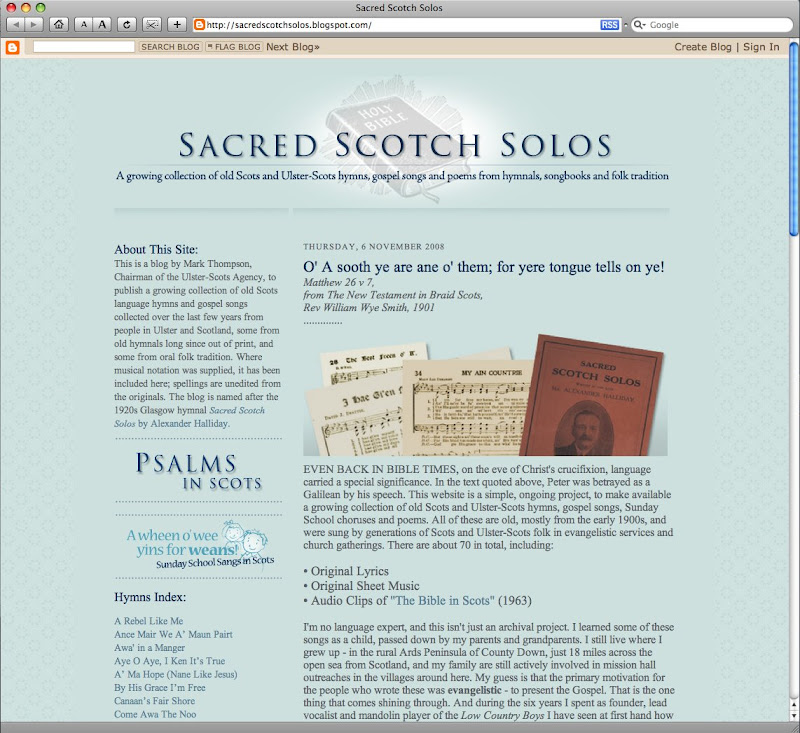
.
Sunday, November 09, 2008
Private James Thompson, R.I.R of Kirkistown, killed at the Somme, aged 20
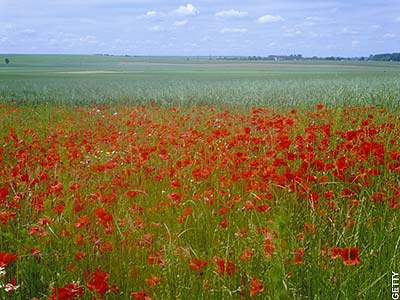
The photo above is of the poppy fields of the Somme in France. As it's Remembrance Day, I thought this would be a relevant poem to post here. As far as I know James was my grandfather's cousin - my granda was 15 when James was killed aged 20 on the blood-red battlefield of the Somme.
In Loving Memory of our Dear Son
Private James Thompson, R.I.R of Kirkistown
Who was killed in action at the Battle of the Somme at Thiepval
on 1st July 1916, aged 20 years
“What I do thou knowest not now; but thou shalt know hereafter” -
John 13 v 7
A loved one has been called away
He’s in our midst no more
In a land afar his body lies
Far from his native shore
He bade us all a last farewell
A happy brave “Good-bye”
And with the gallant few went forth
To suffer and to die
Upon the first day of July
Amidst the shot and shell
‘Twas in the battle of the Somme
He in the conflict fell
What anguish fills each fainting heart
And many cheeks grow pale
And in that sorrow-stricken home
How many mourn and wail
None in that home shall e’er forget
The one so bright and fair
Who young in years were called away
Now sits a vacant chair
No one was near when in that hour
He breathed his latest breath
But Jesus led him gently on
Thro’ the dark vale of death
He answered not the roll call here
But in that world so fair
When Jesus calls the roll above
He’ll not be missing there
We know ‘twas in that solemn hour
His spirit took its flight
To dwell with God above the skies
In realms of love and light
Oh, sorrow not, but cast your care
On Christ, the Unfailing One,
Who ever doeth all things well
And say “Thy will be done”
Let this a warning be to all
To cease their sinful strife
Thy soul may be required of thee
Escape thou for the life
Oh, be prepared to meet thy God
This warning he doth give
Consider now your latter end
Believe and thou shall live
And then, where parting is unknown,
All sorrow shall be o’er
For strife and conflict never come
On yonder happy shore.
Note: according to the Commonwealth War Graves Commission, the memorial of rifleman James Thompson of the Royal Irish Rifles (A Company, 13th Service Battalion, County Down) is at Thiepval, Pier and Face 15A and 15B. His parents are recorded as William and Margaret Thompson, Kirkistown, Kirkcubbin.
.......................
There have been many songs written about war and sacrifice over the years. Here are two clips of an old song called "When the Roses Bloom Again", firstly by Johnny Cash and secondly a more mournful, thoughtful version by the American "alternative country" band Wilco:
In a similar vein, here is 10 year old footage of the (throughothersome) American band Whiskeytown, performing their song "Houses on the Hill" which has a verse about a young American soldier at the Normandy landings of 1944:
"...Eisenhower sent him to war
He kept her picture in the pocket that was closest to his heart
And when he hit shore, it must have been a target for the gunman.
There were stars in the sky
There were bunkers on the hill and there were caskets to fill
Where he would lie, shrouded in the red white and blue, with the stripes..."
Outside Belfast City Hall is a monument which was unveiled by General Eisenhower in 1945. At the end of his speech, he said "...My Lord Mayor, in inviting me to return here to become an honorary Burgess you have given one further proof of the ties of affection which bind the American Army to the people of Northern Ireland. I trust that you look upon it, as I do, as a token of our common purpose to work together for a better world..."
Friday, November 07, 2008
Politics and Branding
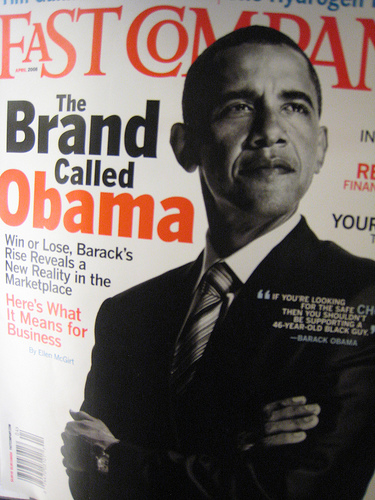
Politics is the purest form of branding. In the commercial world, brands are created to give products personality and distinctiveness. There's little difference in the quality or performance of the product any more - for example the main difference between Coke and Pepsi is the brand, ie the personality that's been carefully constructed around the product, the way it looks, the way it speaks through its advertising, the way its packaging is designed, and the sponsorship it chooses to associate with. All of these things are very carefully crafted by marketing departments to reinforce what the company wants you to "feel" about its product. The feelings of the customer are to some extent manipulated through careful "brand positioning".
If you think that the notion of giving soft drinks a personality is a shocking example of how empty our era is (how or why can fizzy brown sugared water command such attention and loyalty?), then politics takes the whole thing a step further.
Politics doesn't even have a product like fizzy brown water - all it has are ideas, policies... and personalities to convince us of the merits of those ideas.
America has voted for a black man to be its next President. The media has, throughout the Obama/McCain campaign, reduced the whole thing to this single issue. But again, what people have done is voted (to a large extent) based on "brand" - colour, personality, characteristics, presentation - rather than quality or performance. That is not to say that either Obama or McCain lack quality or performance (who am I to judge that?) but the primary decision presented to the global public by the media over recent weeks has been one of brand: black or white / young or old / dynamic or boring / old has-been or a new thinker. The substance of policy has been waaaaay down the list. It would require some very late night viewing of some very obscure news channels to find a policy analysis.
This of course is nothing new, and is certainly not limited to the USA. In Northern Ireland we also vote based on colour - but rather than black v white, it's red white & blue v green white & gold. An old observation in Northern Ireland unionist politics was that if the Unionist Party had fielded a donkey with a red white and blue rosette, people would have unthinkingly voted for it.
Neil Postman, again in Amusing Ourselves to Death, wrote that in the 1858 US Presidential race, the two candidates would engage in one-to-one debates of up to 7 hours in length, using elaborate and complex language. These debates were attended by thousands of people who listened in rapt attention. By contrast, in his victory speech Barack Obama quoted the lyrics from a Sam Cooke song.
The Obama "brand", like all brands, is about emotion and feeling - a very carefully constructed brand strategy. Think I'm wrong or bonkers? Check this out - and especially this.
Sadly, brands are all that today's over-marketed and over-sentimentalised Western public can understand.
Wednesday, November 05, 2008
Radio Ulster today
An interesting wee Freudian slip on BBC Radio Ulster today - during the Obamania coverage they referred to John F Kennedy as both the first Catholic US President and also the first US President of Irish descent.
Which must therefore mean that these 17 Presidents of Presbyterian Ulster-Scots descent aren't Irish?
Which reinforces my point made here.
Great quote...
"Whenever you find youself on the side of the majority, it's time to pause and reflect."
Mark Twain
Monday, November 03, 2008
The Dollar and the Devil
I was going through some old stuff over the weekend, and found this old song in a 1933 book by Frank and Jim McCravy - another brother duet. They were from South Carolina and recorded during the 20s and 30s. Graeme and I learned some McCravy Brothers songs at Carrowdore Sunday School in the 1970s and 1980s - so they had quite an impact.
The song was originally called "Two Rulers [The Dollar and the Devil]", and was written by James Larkin Pearson in 1911. It was first recorded by a Henry Whitter in 1924 - here's a link to his version.
IN THIS WORLD of frill and fashion where the churches are so fine
And the trademark of religion is the classic dollar sign
There's a rule that never faileth and you'll always find it true
Where the dollar rules the pulpit there the Devil rules the pew
Chorus:
There may be a lot of singing and an awful lot of pray'r
And the sermon may be answered by an Amen here and there
But as sure as I'm a-talkin' and your taxes will come due
Where the dollar rules the pulpit there the Devil rules the pew
When the money gets to talking and the Master's voice is still
And the preacher swaps his sermon for a twenty dollar bill
That's the time old Mister Satan gets the churches in a stew
Where the dollar rules the pulpit there the Devil rules the pew
When religion goes a-begging and the Bible is forgot
And the preacher preaches nothing but a scientific rot
Then the faithful old believers they are getting mighty few
Where the dollar rules the pulpit there the Devil rules the pew
© 1932 Southern Music Publishing co. Inc
Sunday, November 02, 2008
The wonderful word of God
This old Sunday School chorus came to mind the other day. Between my mother and I we managed to remember all of the words:
I have a precious Book, it's the word of God
It's the only book that God has given
As I read God speaks to me, I see Christ and Calvary
The wonderful word of God
Forever it will stand as the ages roll
It's the living and eternal Word
It's my guiding light each day, and without it I would stray
The wonderful word of God
Dear Lord may I each day read Thy precious Word
May I love it and obey it too
May I grow to be like Thee, may my friends see Christ in me
In Jesus' name, amen.
I've only found two other references to it online, Perth Gospel Hall in Scotland, and this blog from Washington state USA.
Amusing Ourselves to Death
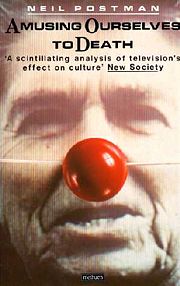
One clear message from the recent Russell Brand / Jonathan Ross controversy is that the media loves nothing better than to talk about itself. A media-created celebrity in some kind of trouble will generate mountains of pointless coverage, airtime and column inches throughout the media kingdom. The media loves to do this because in a way this cements its' own importance, justifies its own existence, asserts its' own supremacy. And the more media channels there are, the more stories it needs to talk about. And so the cycle of banality goes on and on.
A great story is told of an announcement made in the US Congress in the late 1800s, declaring that the building of the telegram network had been completed, and that Washington could now communicate with everyone in the United States from Maine to California. One wise old Congressman, unconvinced by the wonder of this technological achievement, rose to his feet and said "But what if Maine and California have nothing useful to say?". And so it is with the ongoing increase of media channels in our generation.
The best analysis of the influence of the media that I have ever read is Amusing Ourselves to Death: Public Discourse in the Age of Show Business by the late American author Neil Postman. I first read it about 15 years ago. But as the dumbing down of the Western world charges on at an alarming pace, its' message is more relevant now than ever. Buy it here. Other excellent books by Postman are The Disappearance of Childhood and How to Watch TV News.
Of course, blogs are a new, independent, alternative media - and just as prone to pumping out garbage as any other. Back in 1995, Postman gave this interview about the internet:
Put "Amusing Ourselves to Death" on your Christmas list. It'll be like a dose of reality as everyone else in your house dozes through the James Bond re-runs.
Saturday, November 01, 2008
James Hamilton, from Wodrow's Analecta

Here's a lovely story about Rev James Hamilton of Ballywalter, from the latter years of his life in Edinburgh after he had been ejected from his pulpit in the city in 1662. The story takes place sometime between 1662 and Hamilton's death in March 1666:
"...Mr James Hamiltoun, Minister at Edinburgh, was outed and lived at Mortounhall under very great straites. One night, his wife and family and he had noe meal than they gote their supper of, and yet he still kept up his confidence in God. That night, Sir James Steuart of Gutters (Goodtrees)*, who lived not farr from him, but kneu nothing in particular of his present straites, told his Lady**, when in her bed, that he was troubled in his mind about Mr Hamiltoun; and again and again it was born in upon him that he was in straits; and caused his Lady rise out of her bed, and give orders to the servants, early nixt morning, to cary a load of meal to Mortounhall, which was accordingly done, and it came most seasonably.
And he himself came over to dinner to Sir James's, and told him his straites, and that for all his straites, he thought shame that he had not a farthing to give the servant that brought the meal. This I heard the Lady Pollock tell severall times. And Mr Steuart heard it from his grandmother..."
from Wodrow's Analecta or Materials for a History of Remarkable Providences; mostly relating to Scotch ministers and Christians (1842 edition), p 91
With thanks to Alastair Bonar for the quote from Wodrow, and also the illustration (from the Presbyterian Map of Ireland, 1886)
----------------------------------
* Sir James Steuart (1635 - 1713) was Lord Advocate of Scotland 1692 - 1709 and 1711 - 1713. Goodtrees is now called Moredun, in the parish of Liberton. He authored many of the most important books of the era - including:
• Naphtali, or the Wrestlings of the Church of Scotland for the Kingdom of Christ (1667, jointly with Mr James Stirling)
• Jus Populi Vindicatum; or, the People's Rights to defend themselves and their Covenanted Religion (published 1669)
• An Account of Scotland's Grievances (1675, allegedly co-authored with William Carstairs) - after which he was ordered to be arrested.
Steuart and many other Scottish nobles later fled to exile in Holland, but returned in 1688 after the Glorious Revolution. His father, Sir James Stewart of Coltness, had been Lord Provost of Edinburgh from 1648-1649 and again in 1658-59.
** Stewart's wife was Agnes Trail (1646-1690), sister of the famous Covenanter Robert Trail (1642–1716). Robert and Agnes Trail's eldest brother, William (1640-1714), was a Presbyterian minister at Ballendrait in Donegal from 1672 - 1683 and was arrested for his involvement in Blood's Plot. (see Seaton Reid's History of the Presbyterian Church in Ireland, p 422-3)
So once again, the minister from Ballywalter turns out to be a very well-connected and influential man of his time.


